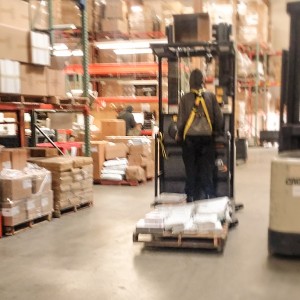Integrating refugees who have resettled in the U.S. can take years. Language barriers, cultural differences, coping after extreme trauma – these are just some of the factors that can make the acculturation time intensive and complex.
 But Classic Accessories (CA), a Kent-based manufacturer and distributor of protective covers for outdoor and recreational gear, has found integrating refugees into their workforce to be a win-win approach. CA’s founder Jacob Engelstein learned about the need JFS had for South King County employers willing to consider workers whose resumes didn’t necessarily conform to the norm.
But Classic Accessories (CA), a Kent-based manufacturer and distributor of protective covers for outdoor and recreational gear, has found integrating refugees into their workforce to be a win-win approach. CA’s founder Jacob Engelstein learned about the need JFS had for South King County employers willing to consider workers whose resumes didn’t necessarily conform to the norm.
CA’s values include “hiring and developing a highly qualified, diverse and dedicated workforce.” And the company walks that talk in the partnership it developed with JFS refugee services.
As a retail supplier, CA’s employment needs fluctuate. In the past, the company worked with employment agencies to staff up for its Labor Day into December crunch time, but they were frustrated with the results of that approach.
Vice President of Operations Sean Coleman explains, “We call an agency and say, ‘We need six people.’ And they will get you six people for tomorrow, but there’s no commitment that those same six people will be there the day after tomorrow. There’s no partnership.” And that wasn’t good for business.
It was different when they partnered with Max Biringer, JFS Refugee Employment Coordinator. In 2014, Biringer began the conversation with CA’s hiring manger to hammer out a plan that would get the company the workers it needed while also fostering successful employee integration and retention.
The company identified the skills and qualities that were a good fit so Biringer could effectively recruit the right candidates. CA took an incremental approach to hiring for their warehouse jobs, onboarding only a couple of candidates at a time so that they could sufficiently train and integrate each of them.
JFS has now placed 14 employees at CA. They originally came from Afghanistan, Iraq, Iran, Rwanda and Sudan. Some from Afghanistan and Iraq worked with the U.S. military or its contractors, ultimately driving their need to flee their home countries.
Integrating refugees in the workforce is not just about employees – it’s about families. “If one of the adults in the family can get a job that meets their expenses, the family can more quickly adjust to their new life and begin preparing for their short and long term goals,” says Biringer. “Everything changes for the better for the whole family.”
Warehouse Manager Isaac Herrera notes that JFS-referred employees move from part-time to full-time and are regularly promoted. He speaks glowingly about their work ethic, “They come wanting to make a better life for themselves and their families,” he says. “They’re fast learners. They’re mature, and every guy has been consistent.”
And as Coleman describes, integrating refugees into their workforce is aligned equally with CA’s business goals and its values. “We believe somebody coming in, working, getting established – that’s an important entrée into the country and the culture – to everything. We feel like we’re doing a good thing, and we’ve had a great experience. Our JFS employees have all been stellar.”
JFS currently works with these area employers for employment placements: The Cheesecake Factory, Taylor Farms, Golden Gate America LLC, Lyneer Staffing and Macy’s. To learn more about partnering with JFS, contact Max Biringer, Refugee Employment Coordinator (253) 850 4065 ext. 11.
 By Deb Frockt
By Deb Frockt
Deb Frockt is Director of Marketing & Communications. She enjoys baking, beaching and learning about golf, both kinds of football, fashion and pop music from her husband and sons.



